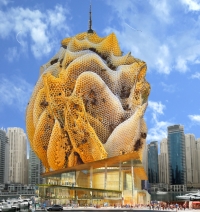
year 0
Although I’m not a honeybee myself, I have always sympathized with their cause. You see, I’m what they call an organic gardener, and I have had the distinct misfortune of watching in horror as one of my neighbor’s insecticides killed off most of the bees in my community for a few summers.
Eventually, the bees came back. But it wasn’t the same bees, and I never really forgave her for her callous use of foolishly dangerous modern poisons.
year 1
When I heard that some particularly motivated bee leaders were organizing a liberation movement, I quickly volunteered to help out in any way I could.

The internationally-renowned Honeycomb Museum was made possible by the Honeybee Liberation Movement. Bees now have the time and resources to practice their art and build fantasy structures.
It’s not always easy for non-bees to empathize. Many bees find the daily pollination of flowers (for other species’ benefit) mind-numbingly dull and bee leaders complain that it leaves them with no time for self expression. This often leads to the kind of bee alienation that Buzzy Friedant writes about in The Bee Mystique.
Bee activists point to the fact that their community doesn’t need to pollinate to survive. In fact, a new GMO thistle hybrid that bee scientists are developing will give honeybees all the nutrition they need within inches of their hives. They will never have to pollinate for others again, or to stray far from the safety of their private hives.
year 3
I was thrilled when I heard the bees had stopped pollinating. I wore bee power tshirts to work because they had finally broken free of their enslavement to the honey-industrial complex. They were no longer peckin’ petals for the man – as the song goes. I used to hum that song when I worked at the fish plant.
year 7
As other species started dying off, pro-Bee PR went into overtime, explaining that these other species had been overpopulating the planet anyways, and we were all a lot better off with their reduced numbers. These species were often parasitic for bees, so extinction was portrayed as a mixed blessing in bee media.
year 9
When the extinctions started affecting the thistle that bees now depended on for their own survival, bee scientists decided to give the entire operation a second look. Of course humans are already extinct, which is a shame – but there is hope that at least bee-kind may be saved from permanent erasure by some kind of future bee technology.
…
Tags: "Free as a Bumble Bee" Abba, freedom to be unnatural, identity politics, inter-species interdependence, liberation movements, mutual responsibility, technology

Leave a comment